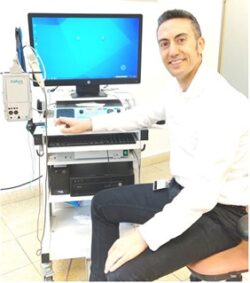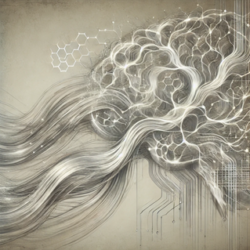AI Neurology Lab – Dr. Shahar Shelly
 Our AI Neurology Lab, the Shelly Lab where we are at the cutting edge of AI in Neurology. We intend to revolutionize neurological research with the power of artificial intelligence. We are leading a transformative approach that blends neuroscience, AI, and computational biology, setting new standards for how neurological data is understood and applied in clinical settings.
Our AI Neurology Lab, the Shelly Lab where we are at the cutting edge of AI in Neurology. We intend to revolutionize neurological research with the power of artificial intelligence. We are leading a transformative approach that blends neuroscience, AI, and computational biology, setting new standards for how neurological data is understood and applied in clinical settings.
Our research lies at the intersection of AI and neurology, marking a significant evolution in the field. By harnessing advanced machine learning algorithms and big data analytics, we can decode complex neural networks, integrate diverse datasets, and develop predictive models that have the potential to reshape clinical practice. At the core of our mission is the integration of AI into neurology, which not only deepens our understanding of neurological disorders but also drives the innovative field of neuroinformatics forward. This interdisciplinary domain combines neuroscience, artificial intelligence, and computational biology, offering a specialized framework to analyze, model, and interpret the vast and intricate data generated in neurology. The Shelly Lab’s AI-driven neuroinformatics initiative is a powerful force in accelerating the translation of research breakthroughs into real-world clinical applications, paving the way for a new era in neurological care.
Pioneering Research at the Intersection of AI and Clinical Practice
At the forefront of neurology and artificial intelligence, our research group is transforming patient care through cutting-edge studies that integrate AI-driven technologies with clinical neurology. Our recent work encompasses a diverse range of neurological disorders and innovative AI applications, setting new standards in diagnostics and personalized treatment strategies.
1. Artificial Intelligence in Cardiac Risk Assessment for Neuromuscular Disorders Our study leverages an AI-ECG algorithm to identify left ventricular dysfunction (LVD) in patients with immune-mediated necrotizing myopathy (IMNM). By predicting LVD with high accuracy, even in asymptomatic patients, the AI-ECG algorithm allows for earlier detection and better-informed decisions on immunotherapy. This innovation marks a significant advance in managing complex neuromuscular diseases, helping prevent irreversible cardiac damage and improving patient outcomes.
2. Accelerated Biological Aging in Genetic Disorders: AI-ECG at the Helm In our groundbreaking research on patients with LMNA mutations—linked to accelerated aging syndromes like progeria—we utilized an AI-driven ECG model to detect an “age gap” between biological and chronological age. The results showed that LMNA mutation carriers exhibit signs of accelerated aging even before clinical symptoms appear. This AI-ECG biomarker could revolutionize early detection, risk stratification, and intervention planning for genetic disorders, setting the stage for a new paradigm in precision medicine.
3. 25 Years of AI in Neurology: A Visionary Perspective Reflecting on two and a half decades of AI integration in neurology, we explore the evolving landscape of AI applications, from early detection tools to advanced predictive models. Our review highlights key milestones, current challenges, and the future potential of AI in shaping neurological care, fostering a proactive, personalized approach that can revolutionize patient management.
Our studies highlight the immense potential of AI to transform neurology, delivering powerful tools for earlier diagnosis, personalized treatment, and better outcomes. We invite you to join us on this journey, where innovation meets clinical excellence, creating new possibilities for patients worldwide.
Discover more about our work and join us in pioneering the future of neurological care!